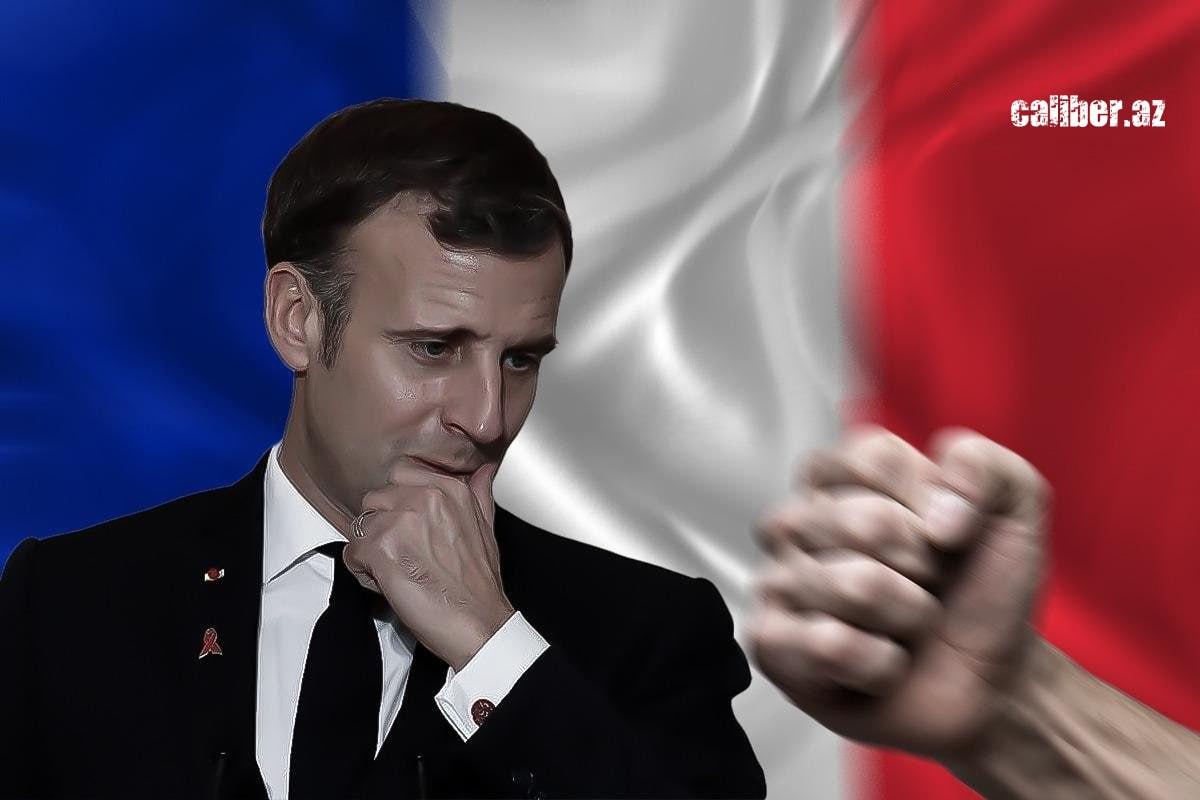Macron vs. Africa: Clash over history, sovereignty, and security Colonial scars resurface
The Uruguayan platform Guambia recently released an eye-opening article, "The French Crisis in Africa: A Dramatic Reality Check!" by Paige Devereaux, delving into the complex web of Franco-African relations. We’re sharing this insightful piece with Caliber.Az readers for a closer look at the unfolding situation.
The complex and often contentious relationship between France and Africa is once again in the spotlight, as recent comments by French President Emmanuel Macron have ignited a fierce backlash. Macron’s remarks, defending France’s military presence in Africa since 2013 as a necessary effort to combat terrorism, suggested that African nations had failed to show gratitude for French intervention, especially in countries like Mali, Burkina Faso, and Niger, which are grappling with escalating jihadist threats.
The response from African leaders was swift and resolute. The Chadian government expressed deep concern, accusing Macron of disrespecting the African continent, and viewing France’s actions as self-serving rather than altruistic. They called for a more honest recognition of Africa’s sacrifices throughout history.
Senegal’s Prime Minister Ousmane Sonko took a more direct approach, correcting Macron’s claim about a negotiated withdrawal from Senegal and reaffirming the country’s sovereignty. He also criticized Macron for neglecting the pivotal contributions of African soldiers during World War II, particularly in light of historical injustices such as the Thiaroye massacre, where Senegalese soldiers were killed by French forces in 1944.
This massacre remains a painful chapter in the collective memory of Senegal and much of Africa. The ongoing scars of colonialism continue to shape the modern political landscape, contributing to a sense of betrayal that lingers in the relationship between Africa and its former colonizers.
Macron’s comments have amplified existing tensions, highlighting the broader struggles that many African nations face in their pursuit of recognition and respect from their former colonial powers. These tensions are rooted in a complex history of colonial exploitation, and as such, the demands for justice, equality, and sovereignty are louder than ever.
The Deep Roots of Franco-African Relations
The relationship between France and its former African colonies is far from straightforward. While the two regions have cooperated in various ways, the legacy of colonialism continues to cast a shadow over interactions. Macron’s recent comments, regarding the justification for France’s military operations in the Sahel, have reignited these tensions, particularly as they intersect with issues of national sovereignty, historical grievances, and the ongoing battle against terrorism.
The Role of France’s Military Involvement
France has been heavily involved in military operations in African nations since 2013, particularly in the Sahel region. The aim has been to combat jihadist groups that pose significant threats to regional stability. Despite the stated goal of protecting security in countries like Mali, Burkina Faso, and Niger, there are increasing concerns about the long-term effectiveness of foreign military interventions. The question remains: are these efforts truly benefiting African nations, or are they serving more of France’s strategic interests?
The Backlash from African Leaders
Macron’s recent comments, suggesting a lack of gratitude from African nations for France’s intervention, have sparked outrage across the continent. Chad was quick to denounce these remarks, underscoring the need for mutual respect and a deeper understanding of Africa’s historical sacrifices. Senegal’s Prime Minister Sonko took it a step further, rejecting Macron’s claims of a negotiated French military withdrawal and calling attention to the historical significance of African soldiers' contributions in both World Wars.

The Haunting Legacy of Colonialism
The memory of the Thiaroye massacre remains an enduring symbol of France’s colonial violence in Africa. This tragic incident, where Senegalese soldiers were killed by French forces, epitomizes the deep wounds that colonial rule left behind. The Thiaroye massacre continues to fuel resentment and shapes the collective consciousness of many Africans, serving as a reminder of the betrayal felt by those who fought and died under the French flag, only to be treated with disdain afterward.
The Broader Struggle for Recognition
Macron’s comments bring into focus the broader struggle for respect and recognition that many African nations feel they have been denied by their former colonial powers. The deepening divide underscores a growing sentiment of disillusionment, as African nations demand acknowledgement of their historical sacrifices and a more equal relationship with their former colonizers.
Evolving Dynamics in France-Africa Relations
The fallout from Macron’s remarks signals a turning point in France-Africa relations. There is a clear shift in how African nations are approaching their relationships with former colonial powers, with an emphasis on equality and sovereignty. As African countries continue to seek greater independence, particularly in the wake of growing political and economic instability, the demand for fairer, more respectful partnerships is intensifying.
A New Chapter for Africa’s Global Influence
As African nations increasingly turn away from historical dependencies on former colonial powers, they are beginning to explore new partnerships and collaborations that reflect their growing autonomy. This shift is driving a re-evaluation of France’s role in Africa, particularly as emerging global players seek to engage with African markets and contribute to the region’s security and development.
The Future of France-Africa Relations
The trajectory of France’s relationship with Africa is at a crossroads. As anti-French sentiment grows in some regions, Africa’s global standing continues to rise, influencing diplomatic ties. The demand for sovereignty, historical justice, and respect will likely be key drivers in shaping future interactions between France and African nations.
Conclusion
The relationship between France and Africa is at a crossroads. As Africans continue to grapple with their colonial past and assert their independence, the demand for respect and acknowledgement of historical injustices becomes increasingly persistent. The dialogue sparked by Macron’s comments may serve as a catalyst for a deeper reckoning between France and African nations, shaping future interactions in a rapidly changing global landscape.








